
Janata Dal (United) ("People's Party (United)"), abbreviated as JD(U), is an Indian political party with political presence mainly in eastern and north-eastern India. JD(U) is recognised as a state party in the states of Bihar and Manipur and is a part of government in both the states. JD(U) heads the government in Bihar and is part of the NDA government in Manipur. JD(U) won 12 seats in the 2024 Indian general election, making it the seventh largest party in the Lok Sabha. JD(U) states that they believe in promoting social justice and lifting up marginalized peoples.
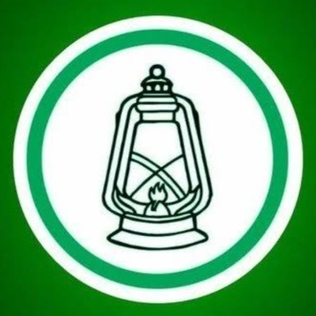
The Rashtriya Janata Dal is an Indian political party, mainly based in the state of Bihar. The party was founded in 1997 by Lalu Prasad Yadav.
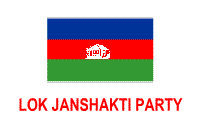
The Lok Janshakti Party was a state political party mainly based in the state of Bihar, India. The party was formed in 2000 when Ram Vilas Paswan split from Janata Dal. The party had a considerable following amongst Dalits in Bihar. The party is factioned into two parties Lok Janshakti Party and Rashtriya Lok Janshakti Party.
Although India is a parliamentary democracy, the country's politics has become dynastic or with high level of nepotism, possibly due to the absence of party organizations, independent civil-society associations which mobilize support for a party, or centralized financing of elections. The dynastic phenomenon is present at the national, state, regional, and district level. The Nehru–Gandhi family has produced three Indian prime ministers, and family members have largely led the Congress party since 1978. The Bharatiya Janata Party (BJP) also has several dynastic leaders. In addition to the major national parties, other national and regional parties such as Dravida Munnetra Kazhagam (DMK), Shiromani Akali Dal, Shiv Sena, Samajwadi Party, Rashtriya Janata Dal, Janata Dal Secular, Jharkhand Mukti Morcha, Kerala Congress, Jammu & Kashmir National Conference, Indian Union Muslim League, AIMIM, and the Nationalist Congress Party are all dominated by families, mostly those of the party founders.

Subodh Kant Sahay is an Indian politician. He served as three term MP of India. He represented the Ranchi constituency of Jharkhand and is a member of the Indian National Congress (INC) political party. He had been holding important portfolios. He was the Cabinet Minister for Tourism until 28 Oct 2012. He is referred as one of the closest to former Prime Minister Dr. Manmohan Singh and former UPA Chairperson Smt. Sonia Gandhi. According to sources, Sonia Gandhi knew him for his truth and hard work. He was the Minister for Home in V.P. Singh government. Sahay was asked to resign in 2012 from his ministerial post by Manmohan Singh in light of favoring his brother in allocation of coal mine blocks in the infamous Coal Scam.

Raj Narain was an Indian freedom fighter and politician. He won in a famous electoral malpractice case against the then Prime Minister Indira Gandhi, which led to her disqualification and imposition of the Emergency in 1975. He defeated Gandhi during the 1977 Lok Sabha elections.
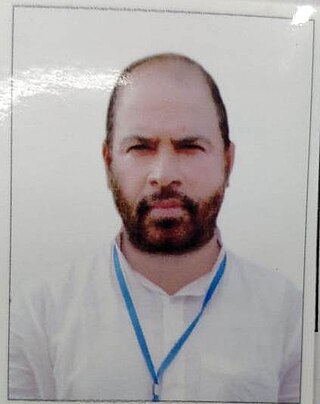
Anirudh Prasad Yadav, better known as Sadhu Yadav, is an Indian politician and founder of Garib Janta Dal (Secular). He has served in 14th Lok Sabha as MP of Gopalganj from 2004 to 2009 as Rashtriya Janata Dal (RJD) candidate. Sadhu was MLA of Gopalganj assembly from 2000 to 2004.
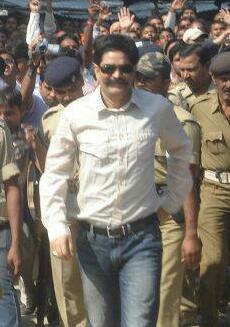
Mohammad Shahabuddin was a politician and former Member of Parliament from the Siwan constituency in the state of Bihar. He was a former member of the National Executive Committee of the Janata Dal and the Rashtriya Janata Dal. Shahabuddin was disqualified from contesting elections following his conviction for the kidnapping and disappearance of Chote Lal Gupta, an activist of the Communist Party of India (Marxist–Leninist) Liberation for which he was serving a life sentence. He was also accused of killing 15 other Communist Party activists, including the former student leader Chandrashekhar Prasad.
Sitaram Yadav is an Indian politician who was a member of the 14th Lok Sabha of India. He represented the Sitamarhi constituency of Bihar as a member of the Rashtriya Janata Dal (RJD) political party.

Giridhari Yadav is an Indian politician, Member of Parliament (Loksabha) and member of Janata Dal (United) political party. He represents Banka Lok Sabha Constituency, Bihar.

Jay Prakash Narayan Yadav is an Indian politician from Bihar. He served as the Minister of State of Water Resources during UPA I under then Prime Minister Manmohan Singh. He was a member of the 14th Lok Sabha of India. Yadav represented the Munger constituency of Bihar and is a member of the Rashtriya Janata Dal (RJD) political party. He won the 2014 Indian general election from Banka Constituency and in 2019 and 2024 lost to Giridhari Yadav from the same constituency.
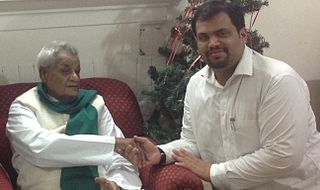
Jai Narain Prasad Nishad was an Indian politician and member of parliament from Muzaffarpur Lok Sabha Constituency in the Indian State of Bihar. He was a Union Minister for State in 1996-1998 and has been a member of Lok Sabha five times and a former member of Rajya Sabha. He was a member of Janata Dal (United) and with the Bharatiya Janata Party. His son, Ajay Nishad is the MP of Muzaffarpur.
The politics of Bihar, a state in east India, is dominated by regional political parties. As of 2021, the main political groups are Rashtriya Janata Dal (RJD), Bharatiya Janata Party (BJP), Janata Dal (United) (JDU), Indian National Congress (INC), Left Front, Lok Janshakti Party (LJP), Hindustani Awam Morcha (HAM). There are also smaller regional parties: Samata Party, Rashtriya Jan Jan Party, Rashtriya Lok Janata Dal, Jan Adhikar Party and Vikassheel Insaan Party, Lok Janshakti Party and Rashtriya Lok Janshakti Party. As of 2024, Bihar is currently ruled by NDA. This is after JDU broke away from a Mahagatbandhan coalition and returned to NDA fold.
Raghopur or Raghopur-Supaul Vidhan Sabha constituency was an assembly constituency in Supaul district in the Indian state of Bihar.

Raghopur is an assembly constituency in Vaishali district in the Indian state of Bihar. It consists of Raghopur and Bidupur.

Mahabali Singh Kushwaha(born 20 April 1955) is an Indian politician belonging to Bhabua, Kaimur district, Bihar. He was a member of the Indian Parliament, representing Karakat.
The list of political families of Bihar state of India:
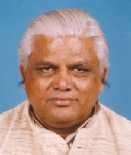
Shakuni Choudhary is an Indian politician who is a founding member of Samata Party. He was elected to the Lok Sabha, lower house of the Parliament of India from Khagaria Lok Sabha constituency as member of the Samata Party. Choudhary has been known for political defection and has remained Deputy Speaker in the Bihar Legislative Assembly.
Ramai Ram was an Indian politician from Bihar. He was a prominent Dalit leader. He was associated with many political parties in his 50 year long political career; Janta Paty, Rashtriya Janta Dal, Janata Dal(United) and VIP. He was nine times MLA from Bochahan constituency of Muzaffarpur district in Bihar.
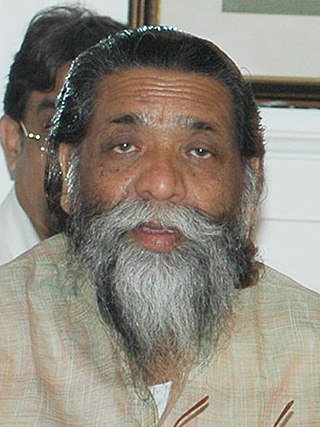
This is the alphabetical categorised list of statewide, regional and local political families involved in the politics and various elections of Jharkhand state of India at state and National level. The Soren family has produced two Chief Ministers, and family members have largely led the Jharkhand Mukti Morcha (JMM) since 1972. The Bharatiya Janata Party (BJP), Indian National Congress (INC) and All Jharkhand Students Union (AJSU) also has several dynastic leaders.













